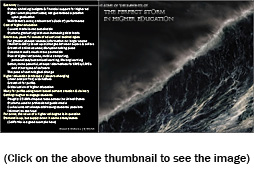Disappearing Departments — from InsideHigherEd.com
Kean University department chairs have spent a year on the endangered species list, and now they appear headed for all-but-certain extinction.
A rough plan to eliminate chairs took shape last May amid heavy protest, and administrators now have a draft proposal they say could be carried out as early as July. The plan, which would replace departments with schools headed by presidentially-appointed “executive directors,” has been met with renewed furor from faculty, who view it as a power grab that leaves the future of many disciplines uncertain. The university has already moved to eliminate such departments as philosophy and social work, but this plan would kill even large departments like English and biology, dividing faculty members into new organizational structures they played no role in creating.
“The university has become a battlefield, [where administrators] do as they see fit, when they see fit without any academic justification,” said Bryan Lees, a chemistry professor (emphasis DSC).
From DSC:
And what would you do if you were in the administration’s position? Funds are running short…budgets are tightening big time…and we’re getting down to the bone in many institutions of higher education (if you doubt this, check out one of Ray Schroeder’s blogs).
Like it or not, institutions of higher education are businesses — most often with excellent, noble goals that better our societies around the world. But they are businesses; and, like so many other types of organizations out there, it comes down to funding and sound business models.
To survive and thrive today, we all must come to the table to help initiate change where it is necessary to do so. Let’s be proactive, and creative in our thinking — being willing to make changes — before it’s too late. If we do not, administration may have no choice (in many situations out there) but to make some tough decisions and you and I might find ourselves on the short end of the stick. The ax may have to come out.
Did we sit back and watch this situation unfold? What steps did we take to stop this bubble from getting any bigger? Regardless…the key question now is:
How can we survive and thrive during this period of change?
- To me, the first and foremost answer to that question is that we become willing to change.
- Secondly, we realize that we are on the same team; it should not be administration vs. everyone else.
- We be creative and responsive in our thinking. Let’s not get broadsided. Keep an eye on the trends out there and be responsive to them.
- Develop new types of cross-disciplinary degrees, especially ones that allow for students to be creative, and to identify and follow their passions.
- Then see my other suggestions at: http://danielschristian.com/










